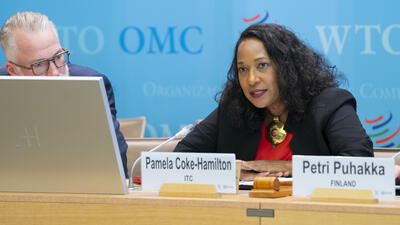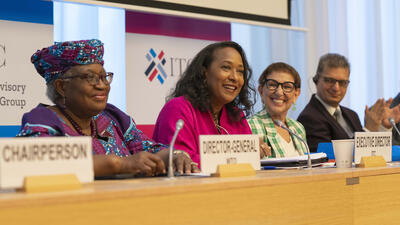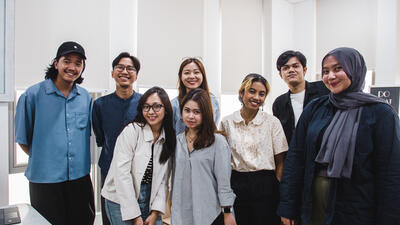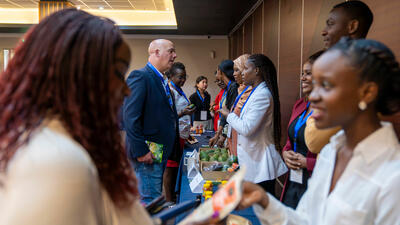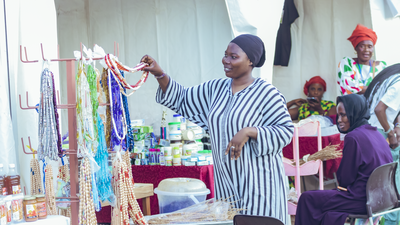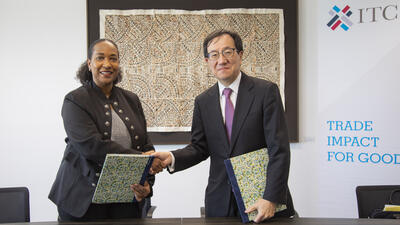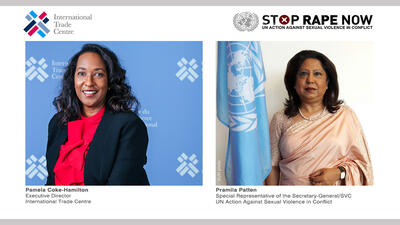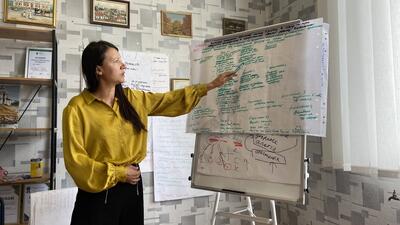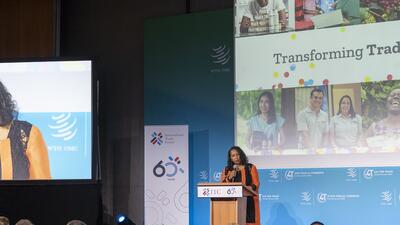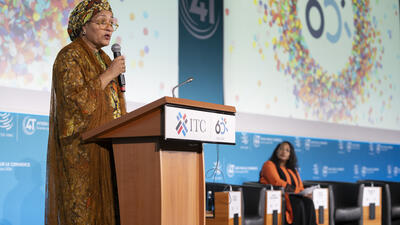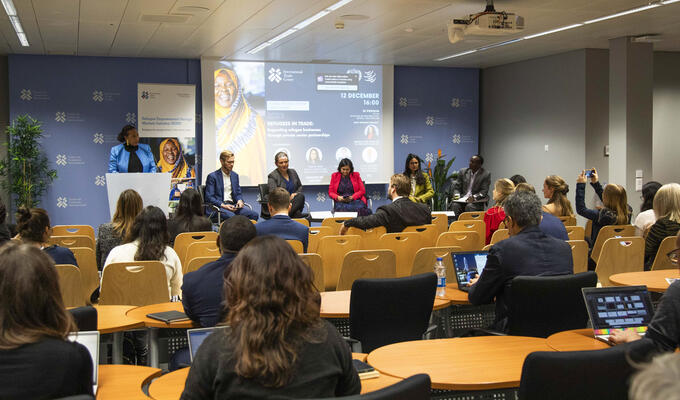
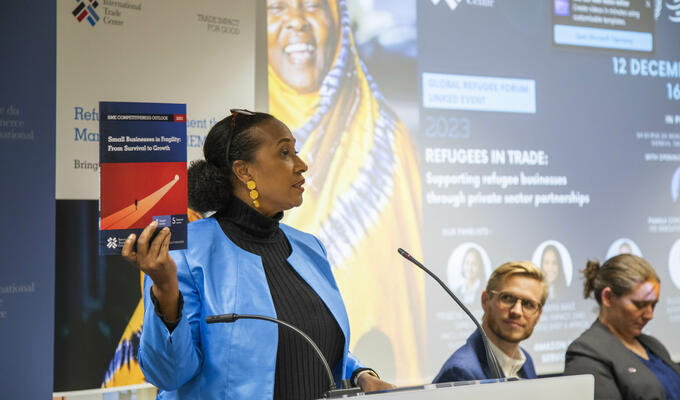

Supporting refugees through trade
Executive Director Pamela Coke-Hamilton delivered the opening remarks for ITC’s linked event at the Global Refugee Forum, emphasizing how trade can support refugees.
Greetings, everyone, and thank you for joining us at this Global Refugee Forum-linked event!
Five years ago, almost to the day, the UN General Assembly endorsed the Global Compact on Refugees. That was a pivotal moment, one which recognized that without international cooperation, any efforts to support refugee populations and host communities would fall short.
Since then, the Global Refugee Forum has brought together partners of all stripes—from non-profits to UN agencies to governments to the private sector—to find creative solutions. I’m honoured that ITC is contributing to these efforts, and it’s clear that this collaborative approach is delivering results.
You’ll soon hear much more about why this collaboration matters from our partners and panellists, Visa Foundation, Amazon Web Services, and Inkomoko. I’d like to thank them for their generous support in making today’s event possible, and I’m excited for you all to hear more about the valuable work they’re doing to translate the Global Compact’s objectives into results.
But before we begin our conversation, I want to tell you a story—one that shows both the challenges, but also great potential, for refugees to take part in international trade.
Over 30 years ago, civil war in Somalia drove scores of people across borders into neighbouring countries in search of safety. Many of those refugees eventually found themselves in Dadaab, a large refugee camp in Kenya. Decades later, many remain. Often, so do their descendants.
One of these refugees is a woman named Nimo Ibrahim Hassan. She was born and raised in Dadaab, and she’s a talented videographer and photographer who has channelled her creative passions into her own business as a freelancer.
We helped her join a collective of freelancers, made up of fellow refugees, so she could build up her digital skillset, make connections, and have access to more job opportunities. But there are still challenges that she and her fellow freelancers face, such as having consistent access to electricity in their refugee camp and, therefore, internet, and having the right identification cards to get work opportunities.
More and more, we at ITC work to help refugees, just like Nimo, as they engage with clients, access local and international markets, and provide crucial goods, services, and jobs for their communities. They do this despite living in fragile contexts, which makes it costlier for them to start their businesses and keep them going. Unfortunately, today fragility is becoming part and parcel of the world we live in. But it doesn’t have to be that way.
That’s why we devoted the latest edition of our flagship report, the SME Competitiveness Outlook, to what it means for small businesses to operate in fragile and conflict-affected settings, and what they need most to break out of the “vicious cycle” of fragility.
For one, we learned that while fragility looks different wherever you are, there are some key principles that apply across the board. One of the biggest ones is “do no harm”—meaning that we have to ensure that our efforts don’t make a difficult situation worse.
At ITC, that’s meant undertaking conflict sensitivity assessments for our work in supporting refugee businesses, making sure that our efforts fit in with peacebuilding efforts underway and ensures that refugees and host communities are in the driver’s seat. We’re also making sure that our work factors in what these interventions mean for the wider economy, including but not limited to refugees and their host communities.
Second, we’ve learned that we have to look deeper than just at the country level when we’re talking about fragility: for instance, many countries that may appear stable overall may have fragile pockets. The inverse also holds true: some countries that are fragile overall also have pockets of stability, and there’s a lot we can learn about the factors that make that stability possible, especially the role that small businesses play.
Third, fragility does not stem just from conflicts: in just the past few years, the world has suffered a brutal toll from geopolitical tensions, supply chain disruptions, and environmental degradation. And there is also the existential threat that looms over us all: that is, of course, climate change.
I was in Dubai earlier this month at COP28, and one of the first announcements that emerged was that over 70 governments and 40 organizations had signed onto a declaration on climate, relief, recovery, and peace. It’s a declaration that foregrounds the nuanced relationship between our climate crisis, fragility, and conflict. And it acknowledges that these different forces have varying impacts in different contexts, and for different groups, including women, young people, refugees, and host communities.
It’s an important step in the right direction—and it’s part of a much bigger conversation about fragility, one that we’re playing an active part in.
Our own work shows that tackling fragility is a team effort, one that no one can achieve alone. We need a two-pronged approach, one that brings together both small businesses and state actors, and that also brings together partners across the realms of humanitarian assistance, development, and peacebuilding.
Our own research for our SME Competitiveness Outlook was made possible through those very partnerships, and we owe a great debt to the ICRC and the Norwegian Refugee Council. Along with being partners on the ground, they also provided invaluable insights and data that informed our analysis, and we look forward to continued collaboration over the years to come.
We’re now applying these lessons to our work supporting other refugees, like Nimo, under our “Refugee Empowerment Through Markets Initiative.” Specifically, we’re looking at which factors make it harder for refugees to access markets and engage in trade—such as inadequate infrastructure—and seeing where private sector partners can help.
More and more, private sector partners are crafting employment programmes that are changing the game for refugee populations. And the need for these programmes is growing by the day, especially in our increasingly fragile landscape. By supporting refugees as they grow their businesses and engage in trade, these programmes are yielding not just economic benefits, but also helping fill crucial gaps in public goods and services.
That's exactly the kind of effort we need to break the vicious cycle of fragility, and in turn regain lost ground in achieving the Sustainable Development Goals. And it’s that kind of effort that our new initiative is supporting.
Thank you all, and I’m now delighted to give the floor to our esteemed panellists for today’s conversation.




